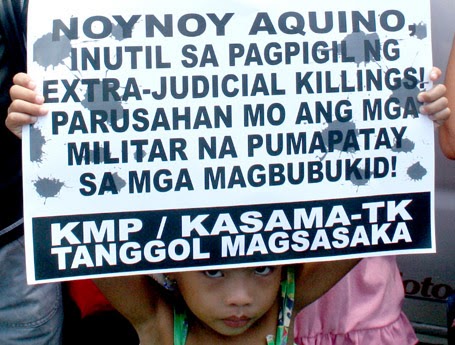by DAVAO TODAY
DAVAO CITY – Human rights advocates slammed President Aquino’s human rights record amidst cases of extrajudicial killings and deprivation of social and economic rights.
Karapatan presented initial reports that 152 extrajudicial killings occurred under Aquino’s term in the past three years.
The group’s secretary general Cristina Palabay said “at least one extrajudicial killing per week was committed by state security forces under Aquino.”
The cases included the killings of two journalists in Valencia, Bukidnon and in Surigao City the past two weeks.
Palabay also cited two cases of killings including Pedro Tinga, a 57-year old Mansaka tribal leader from Maco, Compostela Valley, who was killed on December 6 during a military operation.
Nixxon Tungao, a farmer in Lugait, Misamis Oriental bled to death in a clash with a demolition team defending his house.
Palabay blamed Aquino on the state of human rights.
“We hold Aquino accountable for the 152 extrajudicial killings and 168 frustrated killings, 18 enforced disappearances, 358 illegal arrests and detentions on trumped up charges, tortures and other gross human rights violations, in his term, affecting a great number of the peasantry, indigenous people and urban poor dwellers,” Palabay said.
Karapatan’s local chapter in Southern Mindanao also said 16 farmers were killed in this region in the past three years.
Pedro Arnado, spokesperson of the farmers group Kilusang Magbubukid ng Pilipinas (KMP) Southern Mindanao chapter, said these victims have been farmers and indigenous peoples who voiced out their right to security of their livelihood.
“Ginapatay katong mga nag alsa, katong mga nibarug sa ilang kayutaan na kontra sa pagsulod sa mga dinagkong pagmina og plantasyon (They kill those who raised their voices and those who stood up against the entry of large-scale mining and plantations into their land),” Arnado added.
Arnado alluded to cases of farmer leader Rudy Dejos, Italian missionary Fr. Fausto Tentorio and Blaan leader Juvy Capion who voiced opposition to military and paramilitary presence in their communities.
Dejos was a barangay human rights official who opposed peace and development operations of the Philippine Army’s 39th Battalion.
Tentorio was also critical to the expansion of plantations in indigenous areas in Arakan, North Cotabato; while Capion and his family were anti-mining leaders against a large mining company.
Arnado asked why government failed to address the farmers’ plight but instead focused on the “peace and development” program of the military.
“They have not been sincere to promote the welfare of the farmers. There are no farm tools, carabaos, proper roads, machines and most especially land for us farmers. There is a Department of Agriculture but did they give anything to farmers?” Arnado asked.
Karapatan Southern Mindanao spokesperson Pastor Jurie Jayme blamed Aquino’s counterinsurgency program Oplan Bayanihan for “pervading the impunity” in the country, which he said not only aggravates human rights but also the social and economic rights of communities.
He pointed out the displacement of communities in military operations contributed to loss of livelihood and to children losing access to education and health, as is the cases in Loreto, Agusan del Sur and Compostela, Compostela Valley.
“Being deprived of social services such as education, housing and rampant landlessness are forms of violations of one’s right,” Jayme said.
With Aquino’s trust ratings dipping after the pork barrel scam and handling of the Eastern Visayas disaster, Palabay said dissatisfaction will continue amidst lack of jobs, spiraling prices and lack of economic rights.
“As we all contend with the rising cost of food, fuel and electricity, water and gasoline, transportation, and education and health services… people’s lives are sacrificed and people wallow in poverty and/or killed because Aquino chose to uphold the interests of his political allies, and the foreign and big business,” Palabay said.
“Even the National Statistical Coordination Board (NSCB) concedes that at least one out of five Filipino families live below the poverty line despite government pronouncements of economic growth,” she added.
Meanwhile, the lawyers group National Union of Peoples’ Lawyers issued an “indictment” on the Aquino administration “for the continuing impunity for various human rights violations (and) also for his nonchalant attitude and disinterested callousness amidst injustice for the victims.”
“The figures speak for themselves… Despite its inimitable claim of being a signatory to most of the major international human rights instruments and even a drafter of the UDHR, this government has nothing to be proud of today when it comes to human rights. Nothing at all,” said the group’s secretary-general Edre Olalia.
The National Council of Churches in the Philippines (NCCP), an ecumenical group of Christian churches, released a statement saying human rights is about human dignity.
“Human rights is about human dignity… The right to live life in its fullness is a basic human right,” their statement said.
The NCCP denounced violations and systems that deprive people of their rights.
“However, today we see a gross failure to respect the basic rights of the people… “We must choose life. We must denounce and renounce any structure or system that negates life in its fullness. The violation of human rights is a sin and so is the willful denial of human dignity by those who govern,” the statement said.



No comments:
Post a Comment